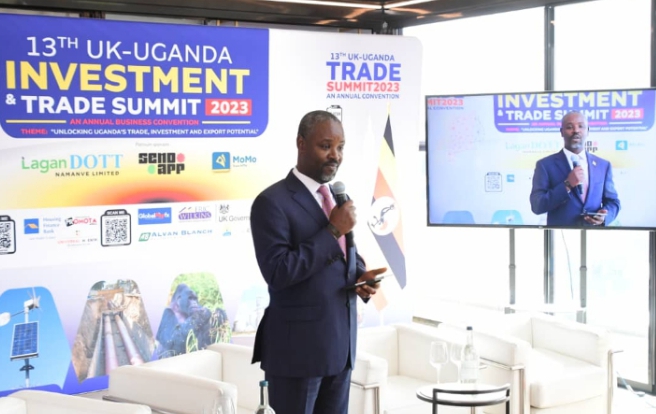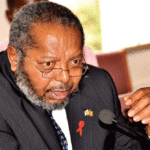The Deputy Speaker of Parliament Thomas Tayebwa has told investors in the United Kingdom that investing in Uganda is a sure deal to the success of their projects because of the prevailing excellent investment environment in the country.
He said the investors are guaranteed of security and a huge return on the investment, citing non-tax and tax incentives and a large market from the East African region, Africa, and access to free markets in China, Europe, and the United States.
Tayebwa was speaking at the Uganda-UK Trade and Investment Summit held at The Skyline London, Blue Orchid Hotels, Tower Bridge, United Kingdom.
“If you’re producing in Uganda, you sell anywhere in the East African Community duty-free, but it is also a get way to the rest of the continent, especially if you’re prepared to benefit from the African Continental Free Trade Area which we believe is going to transform the African continent,” he said.
Tayebwa urged UK investors and businesses to take advantage of Uganda’s profitability by building and locating production facilities in the country.
He said that the Uganda government is now implementing measures including availing efficient, reliable, and cheap electricity, faster internet, and good infrastructure to ease the cost of doing business.
“We have linked with the rest of the content and we have built enough human capital to support your investments and now we are looking at investing in them further to increase their purchasing power. Fighting poverty is our major strategy,” he added.
Themed, Unlocking Trade, Investment, and Export Potential, the Ugandan Convention – UK in its 13th edition seeks to promote trade and investment between Uganda and the United Kingdom.
The event gathered prominent industry leaders, investors, and ministers from the UK and East Africa, to forge new business deals, invest in bankable projects, and reinforce economic relationships between the UK and Uganda, including the East African Community.
Rebecca Kadaga, Uganda’s 1st Deputy Prime Minister and Minister for East African Community Affairs highlighted investment opportunities available in the country.
She listed tourism and water transport on R. Nile and R. Congo, railway systems to further connect the region among other areas for investment.
“River Nile is an area you can think about working on, especially in areas of tourism and water transport. There are also other transboundary projects such as railways that we can consider partnering together to ease the movement of goods in the East African region,” she said.
Uganda Revenue Authority (URA) Commissioner General, John Rujoki Musinguzi explained a number of exciting tax incentives and non-tax incentives for foreign investors including access to land in the industrial parks, facilitation for infrastructure needs, and policy advocacy for a conducive environment.
“The government of Uganda took a decision to identify and support investments, especially in nine strategic areas including education, manufacturing, tourism, construction, health care and medical services, agriculture, ICT, logistics, and warehousing,” he said adding that for each strategic sector, there are different tax exemptions.
Musinguzi told investors that for the customs duties, the exemptions are not just for Uganda but for the East African region.
The market you’re looking at when you think of investing in Uganda is not just a Ugandan market but you’re able to sell goods in the East African market and to guarantee that, exemptions are really catered for in the East African Community Customs Management Act. This means that any goods produced in Uganda will be transferred to Kenya, Tanzania, Rwanda, Burundi, South Sudan, and DRC at no further taxation,” the URA boss said.
He said goods produced from Uganda move free to any of the East African member states.
He told investors that for strategic areas such development of industrial parks, VAT is exempted right from the stage of feasibility studies, design, construction, and all the materials used in setting up the industrial park.
“If you’re a foreign investor, it is assumed that for an industrial park, you will not invest less than USD 10 million but a Ugandan citizen in partnership with a foreign investor, then the threshold for investment reduces to only USD300,000”
“If you want to invest outside Kampala to promote the creation of jobs and industries outside the city, the investment threshold even goes down further to USD 150 US dollars,” he added.
The Minister for Gender, Labour and Social Development, Amongi Betty Ongom told the investors that Uganda has enough skilled and semi-skilled labor force to fuel their investments.
“I’m here to assure you that in Uganda you will get abundant and cheap labor that is also innovative and most qualified to help you strike your investment,” she said.
![]()
























